
A Global Call to Action: Tackling Non-Communicable Diseases at the NCD Alliance Forum
2025-04-08
Author: John Tan
In February, Kigali, Rwanda hosted over 800 delegates from 66 countries for the Fourth Annual Non-Communicable Disease (NCD) Alliance Forum. This gathering was a stark reminder of the rising threat posed by NCDs, which are projected to surpass infectious diseases as the primary cause of death in sub-Saharan Africa by 2030. Chronic conditions such as heart disease, cancer, diabetes, and chronic respiratory ailments currently account for more than 75% of global deaths and threaten to impose an overwhelming economic burden of $47 trillion by the end of the decade.
A Critical Moment for Global Health
The Forum underscored the urgent need for action on NCDs, particularly cancer and diabetes. Despite international commitments, many nations are lagging in achieving the 2025 World Health Organization (WHO) targets that aim to reduce premature mortality from these diseases by one-third. Limited access to essential medicines and inadequate healthcare infrastructure, especially in low- and middle-income countries, continue to be significant barriers to progress.
However, this crisis also presents an opportunity to enhance local healthcare systems. Strengthening infrastructure, expanding access to life-saving treatments, and prioritizing preventive care are crucial for long-term success in fighting NCDs.
Direct Relief’s Commitment to NCD Care
Direct Relief, in collaboration with the NCD Alliance, has taken steps to improve access to NCD care in humanitarian settings. At the Forum, Direct Relief led a panel discussion focused on strategies for strengthening NCD care in low- and middle-income countries. The panel featured experts from various sectors, including representatives from the Tanzania Project Lead for the Global HOPE partnership and AstraZeneca, discussing the impact of advanced therapies like continuous glucose monitors.
The dialogue explored essential strategies for improving NCD care, such as enhancing healthcare capacity and increasing access to next-generation therapies, which can make a significant difference in treatment outcomes.
Transforming Cancer and Diabetes Care
Since 2008, Direct Relief has provided approximately $1.1 billion in cancer medications and diabetes care, impacting patients in over 117 countries. The organization’s Global HOPE program exemplifies its commitment to pediatric cancer care, successfully treating over 26,000 young patients across five African countries and training over 8,154 healthcare professionals.
For diabetes care, initiatives like the Life for a Child program deliver critical resources like insulin and glucose monitors to over 25,000 children in low-income countries. By ensuring access to essential medications, Direct Relief actively improves the quality of life for individuals dealing with these chronic conditions.
Global Engagement Against NCDs
The fight against NCDs is not limited to localized efforts. The Union for International Cancer Control’s Access to Oncology Medicines (ATOM) Coalition seeks to address barriers to essential cancer treatments in lower-income countries. Recent workshops in Mongolia and El Salvador focused on developing context-specific solutions for supply chain management, with Direct Relief staff taking leading roles as expert moderators.
Additionally, Direct Relief's presence at significant international events, like the upcoming International Diabetes Federation Congress in Bangkok, further emphasizes its commitment to global health. This congress anticipates engaging over 5,500 delegates as they strategize on pressing diabetes care challenges, marking IDF’s significant 75th anniversary.
Conclusion: A Unified Front is Essential
With non-communicable diseases on the rise and projected to burden economies and healthcare systems globally, collective action is more critical than ever. Organizations like Direct Relief and initiatives stemming from the NCD Alliance Forum are vital in fostering collaborative efforts to improve care access and prevention strategies. As the world faces the escalating challenge of NCDs, we must unite in our commitment to combatting these silent killers, ensuring a healthier future for all.
Stay tuned for updates on how you can support these initiatives and make an impact in the global NCD fight!


 Brasil (PT)
Brasil (PT)
 Canada (EN)
Canada (EN)
 Chile (ES)
Chile (ES)
 Česko (CS)
Česko (CS)
 대한민국 (KO)
대한민국 (KO)
 España (ES)
España (ES)
 France (FR)
France (FR)
 Hong Kong (EN)
Hong Kong (EN)
 Italia (IT)
Italia (IT)
 日本 (JA)
日本 (JA)
 Magyarország (HU)
Magyarország (HU)
 Norge (NO)
Norge (NO)
 Polska (PL)
Polska (PL)
 Schweiz (DE)
Schweiz (DE)
 Singapore (EN)
Singapore (EN)
 Sverige (SV)
Sverige (SV)
 Suomi (FI)
Suomi (FI)
 Türkiye (TR)
Türkiye (TR)
 الإمارات العربية المتحدة (AR)
الإمارات العربية المتحدة (AR)